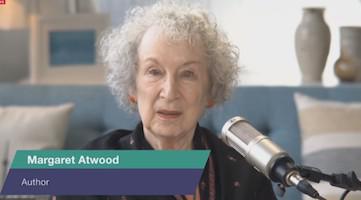This morning, delegates were treated to the critical mind and perceptive words of Margaret Atwood as Simi Sara and Atwood shared the virtual stage to explore the themes of climate change, COVID-19, and community.
 The conversation opened on the topic of community and Atwood spoke of the challenge of translating our physical lives into virtual ones during the pandemic. “Versatility, adaption – if you’ve ever been in smaller communities – that’s the order of the day any way” Atwood quipped as she explored the challenges of individual and community wellbeing during COVID.
The conversation opened on the topic of community and Atwood spoke of the challenge of translating our physical lives into virtual ones during the pandemic. “Versatility, adaption – if you’ve ever been in smaller communities – that’s the order of the day any way” Atwood quipped as she explored the challenges of individual and community wellbeing during COVID.
Sara moved the conversation to Atwood’s MaddAddam trilogy, which explored themes of climate upheaval and biological catastrophe, and delegates were offered a glimpse of Atwood’s upbringing in a family of biologists. She offered the reminder that past generations of biologists were already thinking about climate change, pollution, habitat loss, methane, and decline of interconnected species. Atwood linked dinner table biology conversations to her inspiration for the MaddAddam books: “if you grow up that way, you know everything is connected.”
Continuing the dialogue on climate change, Sara posed the question “what level of government has the most impact?” Atwood was unequivocal in her response: “local, without a doubt.” However, she cautioned that community members are responsible for more than simply voting and must act to make a difference. She implored local governments to get together with people and explore “what is going to benefit us and also benefit the planet.”
Delegates posed numerous, diverse questions to Atwood. On balancing the economy and the environment, Atwood cautioned it’s a question of how we can transition fast enough, and not of stopping one for the benefit of the other. Speaking of wheelwrights and corset makers, she simply stated there is “no rule of the universe that says old jobs must stay in existence after they are no longer of use.” Instead, she encouraged delegates to look to technological advancements, the rise of new materials, and demand as guide posts to identify the new jobs and means of production that could follow.
In a flowing tapestry of conversation, Atwood and Sara covered income and equality, guaranteed income (to which Atwood said “Why not? What have you got to lose at this point?"), the ways in which our social fabric has been protected from collapse, and the modern-day parallels to The Handmaid’s Tale.
The aspirational nature of democracy was discussed and Atwood contemplated a theme we have heard from BC’s Dr. Bonnie Henry – we may be in the same storm, but we’re not in the same boat.
As the session drew to a close Atwood imprinted her encouragement to maintain our hope in challenging times and said quite plainly to delegates “It’s now in your hands local communities – do your thing.”

